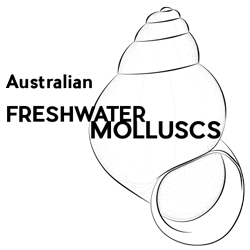
Snails with small neritiform or cylindrical shell with a low spire. The shell surface has raised spiral ribs and transverse striae, giving appearance of small, incised rectangles The aperture length is almost equal to the whole shell, and has a continuous periostracal fringe. The columellar margin is reflected and slightly curved, without a columellar fold. A deep umbilicus is present.
The copulatory organ has an accessory bursa, but lacks a flagellum. A large muscular bulb is suspended from the proximal end of the praeputium, into which the duct of the accessory bursa opens. The anus lies on the anterior edge of rectal lobe.
Bayardella Burch, 1977
Class Gastropoda
Infraclass Heterobranchia
Megaorder Hygrophila
Order Lymnaeida
Superfamily Planorboidea
Family Planorbidae
Subfamily: Miratestinae
Genus Bayardella Burch, 1977
Type species: Plesiophysa (Bayardella) johni Burch, 1977
Original reference: Burch, J.B. (1977). A new freshwater snail (Basommatophora : Planorbidae) from Australia, Plesiophysa (Bayardella) johni. Malacological Review 10: 79-80.
Type locality: Isdell River, Walcott Inlet, north Western Australia.
We follow Walker (1988). We know of at least one undescribed species of Bayardella.
Under wood and stones, in streams and waterholes. At least one species (B. cosmeta) capable of aestivation (Smith and Burn, 1976); biology otherwise unstudied.
Northern, central and eastern Australian mainland.
Only Glyptophysa (Glyptophysa) aliciae has similar heavy periostracal spiral ridges. Bayardella has a narrower and much smaller spire and a less distinct shoulder and is smaller in size than G. (G) aliciae. Bayardella also has a much larger aperture compared to G. (G) aliciae.
This distinctive genus is rather rarely collected except in parts of the Northern Territory where it can be common in a few localities.
Albrecht, C., Kuhn, K. & Streit, B. (2007). A molecular phylogeny of Planorboidea (Gastropoda, Pulmonata): insights from enhanced taxon sampling. Zoologica Scripta 36: 27-39.
Albrecht, C., Stelbrink, B. & Clewing, C. (2019). Planorbidae Rafinesque, 1815. Pp. 181-186 in C. Lydeard & Cummings, K. S. Freshwater Mollusks of the World: a Distribution Atlas. Baltimore, John Hopkins University Press.
Baker, F. C. (1945). The molluscan family Planorbidae. Urbana USA, University of Illinois Press.
Beesley, P. L., Ross, G. J. B. & Wells, A., Eds. (1998). Mollusca: The Southern Synthesis. Parts A & B. Melbourne, CSIRO Publishing.
Burch, J. B. (1977). A new freshwater snail (Basommatophora : Planorbidae) from Australia, Plesiophysa (Bayardella) johni. Malacological Review 10: 79-80.
Hubendick, B. (1955). Phylogeny of the Planorbidae. Transactions of the Zoological Society of London 28: 453-542.
Iredale, T. (1943). A basic list of the fresh water Mollusca of Australia. Australian Zoologist 10: 188-230.
Iredale, T. (1944a). Guide to the freshwater shells of New South Wales. Part 2. Australian Naturalist (Sydney) 11: 113–127.
Smith, B. J. & Kershaw, R. C. (1979). Field guide to the non-marine Molluscs of South-eastern Australia. Canberra, A.N.U. Press.
Walker, J. C. (1988). Classification of Australian buliniform planorbids (Mollusca: Pulmonata). Records of the Australian Museum 40: 61-89.